七省名校名师高考英语专题--反意疑问句、祈使句、感叹
感叹句、祈使句、倒装句、反义疑问句考点复习
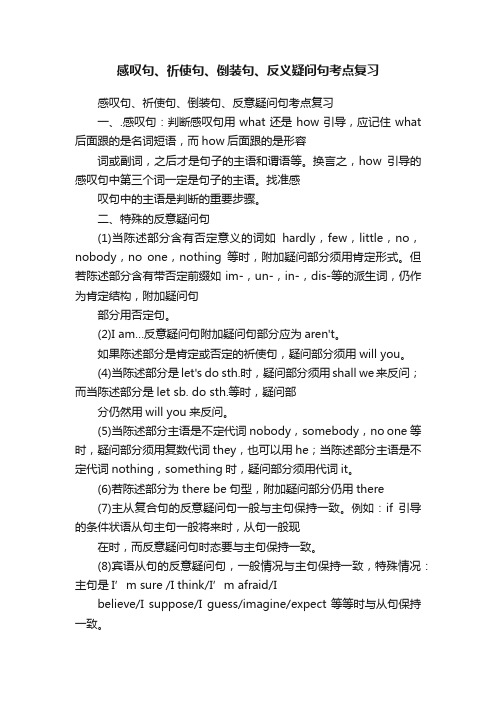
感叹句、祈使句、倒装句、反义疑问句考点复习感叹句、祈使句、倒装句、反意疑问句考点复习一、.感叹句:判断感叹句用what还是how引导,应记住what 后面跟的是名词短语,而how后面跟的是形容词或副词,之后才是句子的主语和谓语等。
换言之,how引导的感叹句中第三个词一定是句子的主语。
找准感叹句中的主语是判断的重要步骤。
二、特殊的反意疑问句(1)当陈述部分含有否定意义的词如hardly,few,little,no,nobody,no one,nothing等时,附加疑问部分须用肯定形式。
但若陈述部分含有带否定前缀如im-,un-,in-,dis-等的派生词,仍作为肯定结构,附加疑问句部分用否定句。
(2)I am…反意疑问句附加疑问句部分应为aren't。
如果陈述部分是肯定或否定的祈使句,疑问部分须用will you。
(4)当陈述部分是let's do sth.时,疑问部分须用shall we来反问;而当陈述部分是let sb. do sth.等时,疑问部分仍然用will you来反问。
(5)当陈述部分主语是不定代词nobody,somebody,no one等时,疑问部分须用复数代词they,也可以用he;当陈述部分主语是不定代词nothing,something时,疑问部分须用代词it。
(6)若陈述部分为there be句型,附加疑问部分仍用there(7)主从复合句的反意疑问句一般与主句保持一致。
例如:if引导的条件状语从句主句一般将来时,从句一般现在时,而反意疑问句时态要与主句保持一致。
(8)宾语从句的反意疑问句,一般情况与主句保持一致,特殊情况:主句是I’m sure /I think/I’m afraid/Ibelieve/I suppose/I guess/imagine/expect等等时与从句保持一致。
--反意疑问句、祈使句、感叹句以及其它特殊句式[1]
![--反意疑问句、祈使句、感叹句以及其它特殊句式[1]](https://img.taocdn.com/s3/m/03e49421ccbff121dd368342.png)
2. You must have misheard, haven’t you?
3. It must have rained last night, didn’t it?
十四、当I wish表示征求对方意见时,附加疑
1. Don’t make noise, will you?/ can you?
2. Don’t tell Joe, will you?
十二、陈述句中含有助动词ought to时,附加 疑问句既可使用oughtn’t,也可使用shouldn’t: 1. We ought to go now, shouldn’t we? 2. We ought to buy a new car, oughtn’t we? 十三、陈述句中含有助动词must时,附加疑问句 使用什么样的助动词,依must的含义而定: a) must作“必须”解时,附加疑问句可以重复 must或改用need: 1. He must keep his word, mustn’t he? 2. They must clean the floor after school, needn’t they?
十七、带有否定前缀的词虽然具有否定意义, 但含有这种词的句子仍被看作是肯定句: 1. That is impossible, isn’t it? 2. He was unhappy about this, wasn’t he?
3. Tom was unfair, wasn’t he?
十八、当陈述部分是主从复合句时,疑问 部分中的动词和代词应和主句中的动词和 主语保持一致,而不是和从句中的动词和 主语保持一致: 1. They know that he is from England, don’t they? 2. He told me he would go there tomorrow, didn’t he?
反意疑问句、祈使句、感叹句以及其它特殊句式
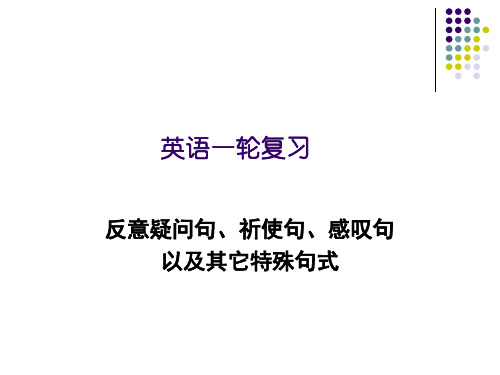
b) 当must not作“禁止”解时, 附加疑问句要用
may:
1. I must not go any further, may I?
2. They mustn’t take the book out of the readingroom, may they? c) must作“一定”、“准是”解时,附加疑问句 的助 动词要与must后面的动词相照应:
英语一轮复习
反意疑问句、祈使句、感叹句 以及其它特殊句式
考纲解读 ………………………………………
知识要点 ………………………………………
考点诠释 ……………………………………… 高考链接 ………………………………………
考纲解读
高考英语在重视对语义和功能考查的同时,并未完全 放弃对语言形式和语言知识类题目的考查,主要涉及 强调句、倒装句、省略句、反意疑问句、祈使句、感 叹句以及其它特殊句式如there be 句型等。 反意疑问句是高考经常考查的语法项目之一,考查的 重点是:祈使句和含有宾语从句的主从复合句的反意 疑问句及句尾的附加成分等。 主要考点有: 1. 祈使句的判断 2. 祈使句固定结构 3. 反意疑问句一般用法及特殊用法
1. They must be playing football, aren’ t they?
2. You must have misheard, haven’t you?
3. It must have rained last night, didn’t it?
十四、当I wish表示征求对方意见时,附加疑
you?
3. I don’t believe he has finished, has he?
五、否定转移句的附加疑问句,其主语应重 复that从句的主语: 1. I don’t think you can do these exercises alone, can you? 2. I don’t imagine he cares, does he? 3. I don’t think she knows French, does she?
祈使句、感叹句、反义疑问句

5, 陈述部分是I am..,疑问部分要用 aren‘t I.
I am officially a college student. Aren’t I?
6,陈述部分有have to +v.原 (had to + v.原),疑问部分
常用don‘t +主语(didn’t +主语)。
You have to become the chair. Don’t you?
No photos at the Monsters Inc.
祈使句的回答
一般用will或won’t回答 注意:回答否定意义的祈使句时 1. 形式一致,即Yes与will保持一致;No与 won’t保持一致。 2. 意思相反,即Yes是不的意思;No是“是” 的意思。在回答时,要注意分析上下文语 境中所提供的条件。
Be careful! There is a huge Frisbee(飞盘) coming through the campus!
3. Let+宾语(人/物)+do…
Let it not be just the beginning of my dream, but the beginning of all of our dreams.
what与how引导的感叹句,可以相互转换。
What an interesting story it is!=How interesting the story is!
What a beautiful building it is!=How beautiful the building is! 在口语中,感叹句的主语和谓语常常省略。 What a nice present (it is)! How disappointed (she/he/… is)!
英语反意疑问句、祈使句、感叹句以及特殊句式

专题十三反意疑问句、祈使句、感叹句以及其它特殊句式【考纲解读】高考英语在重视对语义和功能考查的同时,并未完全放弃对语言形式和语言知识类题目的考查,主要涉及强调句、倒装句、省略句、反意疑问句、祈使句、感叹句以及其它特殊句式如there be 句型等。
反意疑问句是高考经常考查的语法项目之一,考查的重点是:祈使句和含有宾语从句的主从复合句的反意疑问句及句尾的附加成分等。
主要考点有:1. 祈使句的判断2. 祈使句固定结构3. 反意疑问句一般用法及特殊用法【知识要点】反意疑问句由“陈述句+附加疑问句”构成,附加疑问句常常表示反意,因此附加疑问句通常被称为反意疑问句。
附加疑问句由“助动词/情态动词/系动词+主语”构成,它们需要与陈述句的动词和主语对应。
如果陈述句的主语是名词,附加疑问句的主语要用相应的代词替换。
一、反意疑问句重点知识梳理例7 That’s unfair, isn’t it? 这是不公平的,是吗?例8 The meeting is unimportant, isn’t it? 这个会议不重要,对吗?4.如果陈述句是“I’m…”结构时,反意疑问句用aren’t I。
例9 I’m a good student, aren’t I? 我是一个好学生,对吗?例10 I’m going to attend your lecture, aren’t I? 我打算听你的讲座,好吗?5.如果陈述句是“There be”句型,反意疑问句也借助there。
例11 There is a tall tree in front of your house, isn’t there? 你家房前有一棵大树,是吗?例12 There used to be a bus stop near our school, usedn’t there/didn’t there? 我们学校附近曾经有一个汽车站,对吗?例13 There stands an old temple on the top of the mountain, doesn’t there? 山顶矗立着一座古庙,是吗?6.如果陈述句的主语是one,反意疑问句的主语在正式场合用one, 在非正式场合用you。
祈使句、感叹句、反义疑问句

祈使句、感叹句、反义疑问句一、祈使句1.肯定句用动词原形,否定用Don't / Never +动词原形。
Be quite , please!Never be afraid of it!点津:祈使句的其他否定形式:①否定不定式Be sure not to be late.②no + 动名词构成简短否定祈使句No smoking !No talking!③直接用含有否定意义的动词Leave it alone!2. let 祈使句let的宾语可以是me,us ,him,her,it,them或名词,但不能是you。
Let me give you a clean towel.Let's not open the window!3.祈使句的常见句型①祈使句+and+陈述句Work harder and you'll make more progress.②祈使句+or / otherwise +陈述句One more step , and i'd beat you flat.4.带主语的祈使句①表示强调、对比或表示说话人发怒、生气等感情时,需要保留主语。
其谓语动词仍用动词原形,不受主语人称限制。
You go away!John, stand and the rest of you sit down.②强调主语或上级对下级、长者对年轻人或小孩讲话时。
John , come along with me!③someone ,somebody ,everybody, everyone,anybody等也可作祈使句的主语。
Everybody shut up!5.物动词祈使句一般来讲,祈使句都需要动词,但是有些用于口号、告示等的祈使句都是没有动词的。
Patience!Bottoms up!二、感叹句1. what 引导的感叹句①What a / an +形容词+单数可数名词+主语+谓语!What a clever boy he is!②What +形容词+不可数名词+主语+谓语!What fine weather we are having today!③What +形容词+复数名词+主语+谓语!What beautiful flowers these are!2 . how 引导的感叹句①How +形容词/ 副词+主语+谓语!How fast he is running!②How +形容词/ 副词+a / an +单数可数名词+主语+谓语!How difficult a problem it is!③How +主语+谓语!How times flies!3.没有感叹词的感叹句Good heavens!三、反义疑问句的几种特殊形式陈述部分以there开头的句子,疑问部分也用there;陈述部分是there used to ...形式时,疑问词部分用usedn't there或didn't there。
七省名校名师高考英语专题--反意疑问句、祈使句、感叹句以及其它特殊句式

• 但在正式语体中也可以见到用he的实例:
• Everyone knows his name, doesn’t he?
Байду номын сангаас 三、陈述句的主语如果是this,that,these, those,则附加疑问句中的主语要分别用it或 they:
• 1. That is your hat, isn’t it?
学科网备战2015届高考英语一 轮复习
反意疑问句、祈使句、感叹句 以及其它特殊句式
考纲解读
• 高考英语在重视对语义和功能考查的同时,并未完 全放弃对语言形式和语言知识类题目的考查,主要 涉及强调句、倒装句、省略句、反意疑问句、祈使 句、感叹句以及其它特殊句式如there be 句型等。 • 反意疑问句是高考经常考查的语法项目之一,考查 的重点是:祈使句和含有宾语从句的主从复合句的 反意疑问句及句尾的附加成分等。 • 主要考点有: • 1. 祈使句的判断 • 2. 祈使句固定结构 • 3. 反意疑问句一般用法及特殊用法
• you?
• 七、陈述句的主语如果是one,则附加疑问句 • 的主语应当用one(英国英语)或he(美国英语): • One can’t be too careful, can one?/ can he? • 八、祈使句的主语为第三人称时,附加疑问句
• 的主语既可用you,也可用they:
• Somebody open this door, will you?/ will they?
如果前一部分用肯定式,后一部分一般用否定 式;反之,前一部分为否定式,后一部分要用肯 定式,即“前肯定后否定,前否定后肯定”。
对反意疑问句的回答, 无论问题的提法如何, 如果事实是肯定的, 就用yes, 事实是否定的, 就要 用no。
反意疑问句,祈使句感叹句
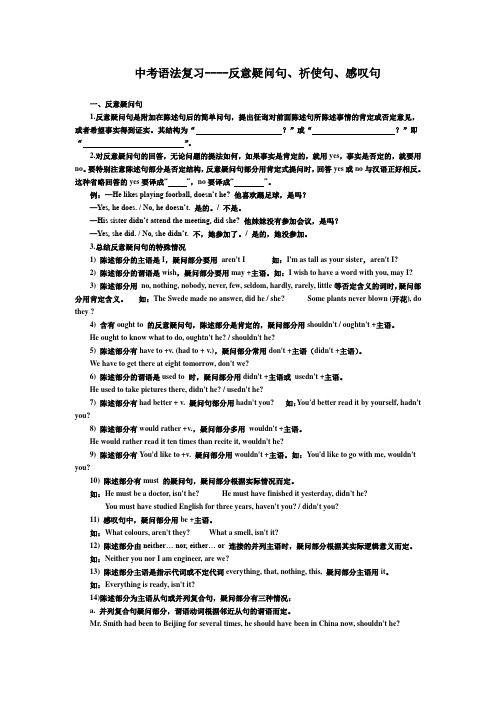
中考语法复习----反意疑问句、祈使句、感叹句一、反意疑问句1.反意疑问句是附加在陈述句后的简单问句,提出征询对前面陈述句所陈述事情的肯定或否定意见,或者希望事实得到证实。
其结构为“?”或“?”即“”。
2.对反意疑问句的回答,无论问题的提法如何,如果事实是肯定的,就用yes,事实是否定的,就要用no。
要特别注意陈述句部分是否定结构,反意疑问句部分用肯定式提问时,回答yes或no与汉语正好相反。
这种省略回答的yes要译成“”,no要译成“”。
例:—He likes playing football, doesn’t he? 他喜欢踢足球,是吗?—Yes, he does. / No, he doesn’t. 是的。
/ 不是。
—His sister didn’t attend the meeting, did she? 他妹妹没有参加会议,是吗?—Yes, she did. / No, she didn’t. 不,她参加了。
/ 是的,她没参加。
3.总结反意疑问句的特殊情况1) 陈述部分的主语是I,疑问部分要用aren't I 如:I'm as tall as your sister,aren't I?2) 陈述部分的谓语是wish,疑问部分要用may +主语。
如:I wish to have a word with you, may I?3) 陈述部分用no, nothing, nobody, never, few, seldom, hardly, rarely, little等否定含义的词时,疑问部分用肯定含义。
如:The Swede made no answer, did he / she? Some plants never blown (开花), do they ?4) 含有ought to 的反意疑问句,陈述部分是肯定的,疑问部分用shouldn't / oughtn't +主语。
专题祈使句,反意疑问句和感叹句

2013届高三英语语法要点精讲(配最新高考+模拟)专题11 祈使句,反意疑问句和感叹句【考纲解读】从近几年的高考题可以看出,在四种简单句型中,考查的重点比较集中,主要考查反意疑问句和祈使句。
作为考查点,在全国卷及地方卷单项填空中每年都以灵活、多变的形式出现。
根据英语语言特点、简单句的考查今后仍是热点。
考查的重点是:祈使句和含有宾语从句的主从复合句的反意疑问句及句尾的附加成分等。
主要考点有:1. 祈使句的判断2. 祈使句固定结构3. 反意疑问句一般用法及特殊用法【知识要点】一、简单句只有一个主语(或并列主语)和一个谓语(或并列谓语)的句子叫简单句。
按照句子的功能,简单句可分为4类:陈述句、疑问句、祈使句、感叹句。
其中陈述句中的否定式、疑问句中的反意疑问句以及感叹句的结构多为考查重点,应重点掌握。
以下将对此作重点分析。
1.陈述句陈述句包括肯定式和否定式两种(肯定式暂略)。
注意以下有关否定结构的问题:He had hardly any schooling before liberation.Not both of them want to go.(=Both of them d on’t want to go.)——hope和be afraid的肯定和否定答语分别为:I hope so./I hope not.及I’m afraid so./I’m afraid not.2.疑问句疑问句分为一般疑问句、特殊疑问句、选择疑问句和反意疑问句。
现主要介绍反意疑问句构成。
形式:句子+简短的疑问句(1)前面若有多个句子并列,则以最后一个句子为准;若前面部分为主从复合句,一般来说,以主句为准;但若主从复合句的主句谓语动词是think,believe,suppose,guess 等,主语又是第一人称且为一般现在时、谓语又没有任何副词修饰时,简短疑问部分的动词、时态、人称则以从句为准,而肯、否定形式依主句而定。
(2)前面句子含有must,can’t,may等表推测的词时,疑问部分则依据句子的时态及时间状语而定。
高考英语·反义疑问句
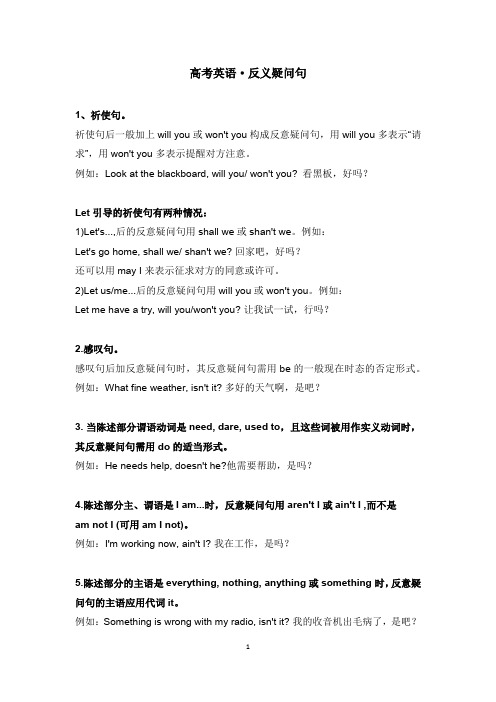
高考英语·反义疑问句1、祈使句。
祈使句后一般加上will you或won't you构成反意疑问句,用will you 多表示“请求”,用won't you 多表示提醒对方注意。
例如:Look at the blackboard, will you/ won't you? 看黑板,好吗?Let引导的祈使句有两种情况:1)Let's...,后的反意疑问句用shall we或shan't we。
例如:Let's go home, shall we/ shan't we? 回家吧,好吗?还可以用may I来表示征求对方的同意或许可。
2)Let us/me...后的反意疑问句用will you或won't you。
例如:Let me have a try, will you/won't you? 让我试一试,行吗?2.感叹句。
感叹句后加反意疑问句时,其反意疑问句需用be的一般现在时态的否定形式。
例如:What fine weather, isn't it? 多好的天气啊,是吧?3. 当陈述部分谓语动词是need, dare, used to,且这些词被用作实义动词时,其反意疑问句需用do的适当形式。
例如:He needs help, doesn't he?他需要帮助,是吗?4.陈述部分主、谓语是I am...时,反意疑问句用aren't I 或ain't I ,而不是am not I (可用am I not)。
例如:I'm working now, ain't I? 我在工作,是吗?5.陈述部分的主语是everything, nothing, anything或something 时,反意疑问句的主语应用代词it。
例如:Something is wrong with my radio, isn't it? 我的收音机出毛病了,是吧?6.陈述部分的主语是 everybody, everyone, anybody, anyone, somebody, someone, nobody, no one, none, neither 时, 其反意疑问句的主语需用复数代词they。
高考英语语法要点细讲精练祈使句,反意疑问句和感叹句

高考英语语法要点细讲精练祈使句,反意疑问句和感叹句【考纲解读】从近几年的高考题可以看出,在四种简单句型中,考查的重点比较集中,主要考查反意疑问句和祈使句。
作为考查点,在全国卷及地方卷单项填空中每年都以灵活、多变的形式出现。
根据英语语言特点、简单句的考查今后仍是热点。
考查的重点是:祈使句和含有宾语从句的主从复合句的反意疑问句及句尾的附加成分等。
主要考点有:1. 祈使句的判断2. 祈使句固定结构3. 反意疑问句一般用法及特殊用法【知识要点】一、简单句只有一个主语(或并列主语)和一个谓语(或并列谓语)的句子叫简单句。
按照句子的功能,简单句可分为4类:陈述句、疑问句、祈使句、感叹句。
其中陈述句中的否定式、疑问句中的反意疑问句以及感叹句的结构多为考查重点,应重点掌握。
以下将对此作重点分析。
1.陈述句陈述句包括肯定式和否定式两种(肯定式暂略)。
注意以下有关否定结构的问题:He had hardly any schooling before liberation.Not both of them want to go.(=Both of them don’t want to go.)All that glitters is not gold.None of these answers are/is correct.We don’t believe that he can do that.—Is Xiao Ming coming?—I don’t suppose so./I suppose not./I suppose so.hope和be afraid的肯定和否定答语分别为:I hope so./I hope not.及I’m afraid so./I’m afraid not.2.疑问句疑问句分为一般疑问句、特殊疑问句、选择疑问句和反意疑问句。
现主要介绍反意疑问句构成。
形式:句子+简短的疑问句(1)前面若有多个句子并列,则以最后一个句子为准;若前面部分为主从复合句,一般来说,以主句为准;但若主从复合句的主句谓语动词是think,believe,suppose,guess等,主语又是第一人称且为一般现在时、谓语又没有任何副词修饰时,简短疑问部分的动词、时态、人称则以从句为准,而肯、否定形式依主句而定。
祈使句,感叹句,反义疑问句,倒装句
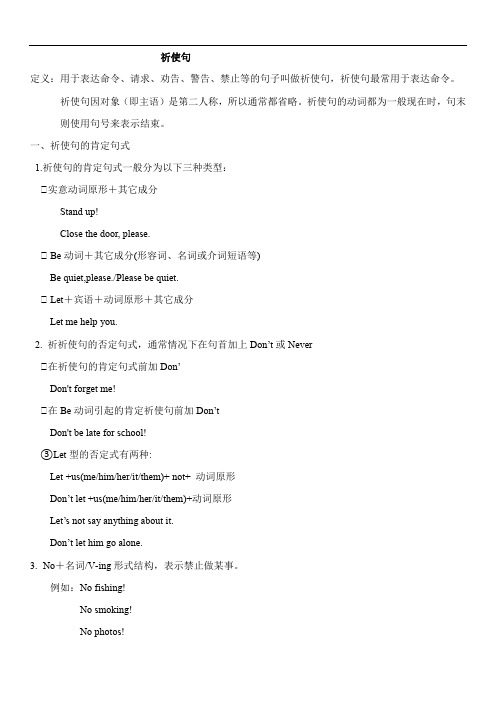
祈使句定义:用于表达命令、请求、劝告、警告、禁止等的句子叫做祈使句,祈使句最常用于表达命令。
祈使句因对象(即主语)是第二人称,所以通常都省略。
祈使句的动词都为一般现在时,句末则使用句号来表示结束。
一、祈使句的肯定句式1.祈使句的肯定句式一般分为以下三种类型:①实意动词原形+其它成分Stand up!Close the door, please.① Be动词+其它成分(形容词、名词或介词短语等)Be quiet,please./Please be quiet.① Let+宾语+动词原形+其它成分Let me help you.2. 祈祈使句的否定句式,通常情况下在句首加上Don’t或Never①在祈使句的肯定句式前加Don’Don't forget me!①在Be动词引起的肯定祈使句前加Don’tDon't be late for school!③Let型的否定式有两种:Let +us(me/him/her/it/them)+ not+ 动词原形Don’t let +us(me/him/her/it/them)+动词原形Let’s not say anything about it.Don’t let him go alone.3.No+名词/V-ing形式结构,表示禁止做某事。
例如:No fishing!No smoking!No photos!4.以may为句首的表示祝愿的祈使句.May you + 动词原形1) 祝你成功!May you succeed!2) 祝你一路平安!May you have a safe journey!5.don’t/doesn’t/didn’t后跟动词原形Please后跟动词原形练习:单项选择1. ________ stand too close to North Americans. Give them more personal space.A. Aren'tB. Didn'tC. Won'tD. Don't2. ---Is there a No. 2 bus stop near here?---Yes, there is. __________ at the second crossing, and you will find it.A. Turning leftB. Turn leftC. To turn leftD. Turns left3. —________. The baby is sleeping. I'm sorry.A. Not talkB. Not talkingC. Don't talkD. Can't talk4. — _______ late for school again, Tim! — Sorry, I promise that I _______.A. Don’t; won’tB. Don’t be; won’tC. Don’t be; don’tD. Don’t; will5. Don’t ___ shy. Everyone may make mistakes at the beginning.A. amB. isC. beD. are6. Please . The boy is studying.A. not noisyB. don’t noisyC. not to be noisyD. don’t be noisy7. —I’m leaving now. —________ you turn off the lights and the computer.A. To make sureB. Make sureC. Made sureD. Making sure8. Tony, ________, or you will get heavier.A. doesn't play sports any moreB. doesn't eat so much meatC. don't play sports any moreD. don't eat so much meat9. Don’t _______ too much TV. It’s bad for your eyes.A. watchingB. to watchC. watchD. watches10. —Would you please _______ near the river? Oh, sorry, I won’t.A. not playB.don’t playC. not to play11. — Please don’t make a noise. — ________ . I’ll be as quiet as a mouse.A. Yes, I doB. No, I don’tC. Yes, I willD. No, I won’t12. — ______, please.K-E-Y.A. What’s thisB. Spell itC. Can you spell itD. What is it13. _________ play in the street. It’s very dangerous.A. DoB. NotC. Don’tD. Doesn’t14. climb the tree! It’s too small. Come down quickly!A. Don’tB. Isn’tC. Aren’tD. Do15. —Don’t forget to close the door after school. — ________.A.OK, I won’tB.OK, I will.C.Yes, I do.D.No, I don’t.16. ---Sorry for being late again. ---__________here on time next time, or you’ll be punished.A. BeB. BeingC. To beD. Been17. _____ drive too fast .We have enough(足够的)time to get there.A. NotB. Don’tC. doesn’t18. Boys and girls, _____in bed. It’s bad for your eyesA. not readB. doesn’t readC. no readD. don’t read感叹句感叹句:表示赞美、惊叹、喜悦等感情;表达喜、怒、哀、乐、惊、恐等强烈情绪;感叹句分为两种:一种以what引导,一种以how引导。
感叹句,反义疑问句,祈使句专练

感叹句、反意义问句祈使句考点专练感叹句:是表示喜怒哀乐等强烈感情的句子。
感叹句句末通常用感叹号,读时一般用降调。
二、感叹句的常见形式1. 由what引出的感叹句其基本结构是“what+a [an]+形容词+名词+主语+谓语”:What a clever boy he is! 他是多么聪明的孩子呀!What a good heart you have! 你的心肠真好!What an interesting book it is!这是多么有趣的书呀!What clever boys they are!2. 由how引出的感叹句基本结构是“how+形容词/副词+主语+谓语”:How tall the man is! 这个人真高!How beautiful the girl is! 这个女孩真美!How slow he drives! 他开得真慢!反意疑问句:它表示提问人的看法,没有把握,需要对方证实。
前一部分是一个陈述句,后一部分是一个简短的疑问句,两部分的人称时态应保持一致。
结构:陈述句+简短反义疑问句(助\be\情+陈述部分主语的相应代词)1. 前肯定+后否定:Sars is scary, it?2. 前否定+后肯定:Sars isn’t scary, it?注意:动词和人称前后一致3. 回答方法:Yes/ Noeg: It often rains here, doesn’t it?I called you yesterday, didn‟t I ?祈使句:祈使句表请求、命令、叮嘱、邀请、劝告等。
祈使句分为第二人称祈1.第二1.人称祈使句通常用来向听话者发出命令,提出要求或建议。
这种祈使句的主语you通常不表示出来,而是以动词原形开头。
如:Stand up!Don’t worry about!2.let为引导词表建议:Let’s go! Let us go home!Let him be here by 10 o’clock.随堂练习:1. He is ___fool, in fact he is very clever.A. noB. no aC. notD. none2. Let‟s ____ take it home.A. notB. not toC. don‟tD. and3. ____ so stupid!A Don‟t B. Don‟t be C. Be not D. Can‟t be4. _____ speak to me like that!A. NeverB. NotC. NoD. Not to5. ____ they had at the party last night!A How fun B. How a fun C. What a fun D. What fun6. How silly ____ to do that!A. youB. for youC. of you it isD. of you7. _____ I miss you!A. WhatB. HowC. How wellD. How that8. In the USA, bus travel doesn‟t cost much,____ ?A. don‟t theyB. does itC. do theyD. doesn‟t it9. You are getting married, _____?A. aren‟t youB. are youC. don‟t youD. do you10. He isn‟t working, isn‟t he?_______.A. Yes he isB. No, he isC. Yes he isn‟tD. I know11. There is nothing wrong with the radio,_____?A. is itB. isn‟t itC. is thereD. isn‟t there12. Sit down, please,_____?A. don‟t youB. do youC. can‟t youD. will you13. There will not be any concert this weekend,_____?A. will itB. won‟t thereC. will thereD. is there14. Let‟s order some delicious food, _____?A. will youB. won‟t youC. can‟t youD. shall we15. The Browns live in the village,_____?A. aren‟t theyB. doesn‟t heC. don‟t theyD. do they16. You must have told him my secret,____?A. mustn‟t youB. didn‟t youC. must youD. weren‟t you17. She seldom goes out at nigh,_____?A. doesn‟t sheB. does sheC. is sheD. isn‟t she18. She has few good friend,_____?A. doesn‟t sheB. does sheC. hasn‟t sheD. is she19. No smoking ______ in the school. It …s not allowed.A. and drinkingB. or drinkingC. and drinkD. or no drinking20. Take _____! Many people hurt themselves when they are ______.A. careful, carefulB. care, carefulC. care, carelessD. care, carefully21. Alice, you feed the birds,______?A. will youB. don‟t youC. do youD. shall we22. Don‟t be lazy, _____ you will make no progress.A. andB. butC. soD. or23. ______ so sad. It‟s not the end of the world.A. Don‟t beB. Be notC. Not beD. Never24. No _____ ! it‟s too dangerous!A. to swimB. swimmingC. swimD. do swim25. _____ quiet! Your little brother is sleeping.A. Don‟t beB. don‟tC. BeD. Never26. Never _____ late for school, ____ your teacher will be angry with you.A. / , orB. be , orC. is , soD. / , but27. Don‟t _____ in the sun! it‟s bad ____ your eyes.A. read , toB. read . forC. reading , forD. to read to28. No matter how hard English is, _____ it.A. no dropB. not dropC. don‟t dropD. never dropping29. Don‟t ______ in the river ____ play beside the river, it‟s dangerous.A. swim, andB. swim, orC. swimming, orD. to swim, and30. Please _______ in the classroom, the others are studying.A. be noisyB. be quiteC. be quietD. make noise31. ____ friendly ____ to everyone!A. How, is sheB. What, is sheC. How, she isD. What, she is32. ____ sunny day today is!A. WhatB. What aC. HowD. How a33. _____ money she has! However, ______ impolite she is!A. How much, whatB. How, howC. How much, howD. What, how34. I don‟t think so, _____?A. do IB. don‟t IC. do youD. don‟t you35. ____fine weather it is! Let‟s go hiking today!A. WhatB. What aC. HowD. How a。
七省名校名师高考英语专题--反意疑问句、祈使句、感叹共59页文档

谢谢!
59Biblioteka 七省名校名师高考英语专题--反意疑 问句、祈使句、感叹
41、俯仰终宇宙,不乐复何如。 42、夏日长抱饥,寒夜无被眠。 43、不戚戚于贫贱,不汲汲于富贵。 44、欲言无予和,挥杯劝孤影。 45、盛年不重来,一日难再晨。及时 当勉励 ,岁月 不待人 。
▪
26、要使整个人生都过得舒适、愉快,这是不可能的,因为人类必须具备一种能应付逆境的态度。——卢梭
▪
27、只有把抱怨环境的心情,化为上进的力量,才是成功的保证。——罗曼·罗兰
▪
28、知之者不如好之者,好之者不如乐之者。——孔子
▪
29、勇猛、大胆和坚定的决心能够抵得上武器的精良。——达·芬奇
▪
30、意志是一个强壮的盲人,倚靠在明眼的跛子肩上。——叔本华
